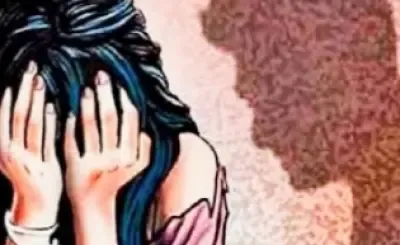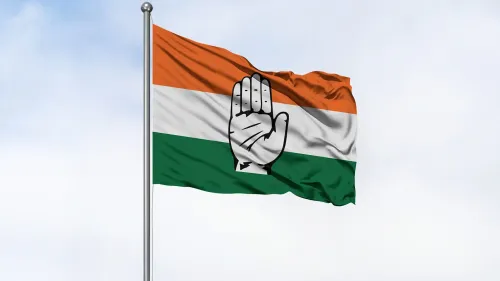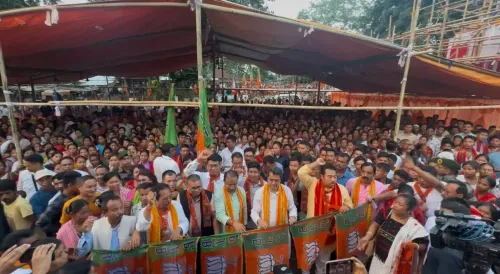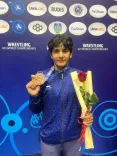How Did PM Modi Inspire Karpoori Thakur’s Great Granddaughter?
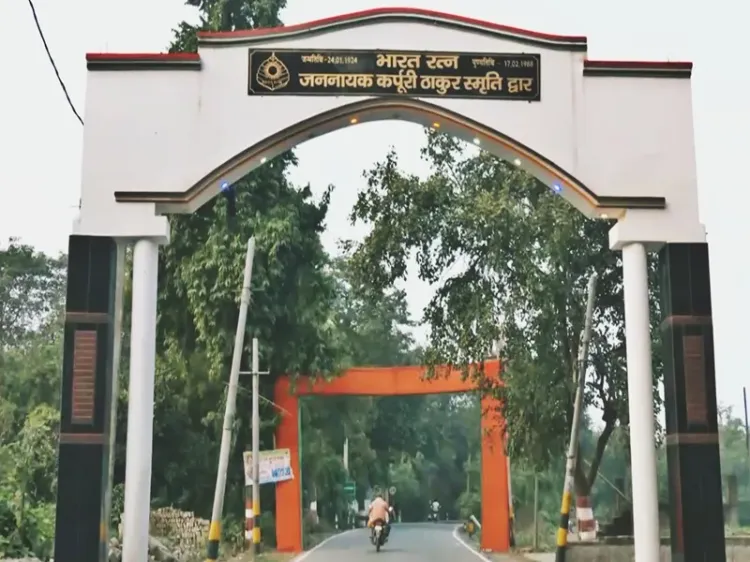
Synopsis
Key Takeaways
- Significance of Legacy: PM Modi's visit highlighted the enduring impact of Karpoori Thakur's contributions to social justice.
- Inspiring Future Leaders: The interaction with Thakur's great granddaughter showcased the importance of nurturing aspirations.
- Community Empowerment: The visit underscored the need for continued efforts to empower marginalized communities.
- Personal Connections: Genuine human interactions were central to the visit, bridging past and future.
- Political Responsibility: PM Modi's address emphasized the importance of political leaders to uphold social justice ideals.
Karpuri Gram (Bihar), Oct 24 (NationPress) Prime Minister Narendra Modi, a key figure in shaping modern India's dreams, visited the modest home of Bharat Ratna Jana Nayak (a leader of the masses) Karpoori Thakur – a socialist icon whose life exemplified the relentless struggle for the underprivileged.
This visit was not merely ceremonial; it served as a link between the sacrifices of the past and the aspirations of the future, highlighting that politics fundamentally revolves around people rather than just elections.
The atmosphere in the village buzzed with excitement as PM Modi reached shortly after 11 am on Friday, following his floral tributes at Thakur's samadhi.
He was accompanied by Bihar Chief Minister Nitish Kumar and a group of NDA leaders. Yet, amidst the security measures and slogans, it was the genuine human connection that truly characterized the moment.
Union Minister Ram Nath Thakur, Karpoori's son and a member of PM Modi's cabinet, stood at the entrance, his eyes reflecting a blend of pride and appreciation.
"By visiting this village, the Prime Minister has honored not only our family but also the very land that raised a jana nayak," Thakur expressed, his voice steady but filled with emotion.
For Ram Nath Thakur, a veteran politician who has inherited his father's legacy, this visit felt like a validation of their struggles.
"Today, he launched his campaign from Karpoori Thakur's birthplace to reinforce the NDA alliance," he continued, invoking the legacy of social justice that once led Thakur to confront the elite. However, he subtly criticized the opposition, saying, "People made him a Jan Nayak, but who anointed Rahul Gandhi as a Jana Nayak? One does not become a Jana Nayak merely by declaration; that is a mistake."
The impact of his words resonated, blending respect with determination, as the NDA aimed to reclaim Thakur's socialist values for Bihar's marginalized communities. Yet, the true essence of the visit was captured in the voices of the younger generation – the grandchildren, eager heirs of a monumental legacy.
Amrita Kumari, Ram Nath's daughter and Karpoori's granddaughter, a bright young woman, found herself sitting across from the Prime Minister in their modest living room, surrounded by faded photographs of Thakur in his iconic white kurta, razor in hand, symbolizing his connection to the Nai community.
"I felt immense joy that he came to our home... I never imagined a towering figure like the Prime Minister would visit Karpuri Gram," Amrita shared with IANS, her eyes glistening. "I am at a loss for words to express my emotions..."
"I am thrilled that Prime Minister Modi visited us. We previously met him at his Delhi residence, and during this visit, he was just as warm and encouraging. He inspired us to embrace challenges when faced with setbacks and to remain focused on our goals," said Amrit Raj, Karpoori Thakur's grandson.
During an informal conversation, PM Modi turned to Manshwi Chandra, Thakur's great granddaughter, patiently listening as she shared her aspirations.
"I told him I aspire to become a doctor," Manshwi Chandra, great granddaughter of Bharat Ratna Karpoori Thakur, earnestly stated. "I wish to experience everything he has done for our India and carry forward my family's legacy. My bade nanaji (great grandfather) has contributed significantly to India and Bihar. Nana ji is also doing a lot. I am eager to enter this field and make a difference."
He blessed her dreams, encouraging her to pursue her studies passionately and to engage in sports and public service. "The Prime Minister offered us numerous blessings and motivated us to continue our education," Manshwi recalled, her cheeks flushed with excitement.
"He inspired us on progressing in sports and political spheres, also asking for our perspectives on Bihar's development and Samastipur," she added.
For her, who has idolized her great grandfather's battles for OBC reservations and land reforms, this was more than just guidance—it was a spark of inspiration.
"The Prime Minister possesses incredible patience; he thinks deeply. His concern for our India is a significant matter," she reflected. The discussion also touched on the ambitions of her peers—fellow students contemplating India's path in politics and society.
"All our discussions with him centered on our thoughts about India and politics as students," Manshwi shared, expressing her admiration as Prime Minister Modi requested everyone, including his security personnel, to remove their shoes before honoring the portrait of her great grandfather (Karpoori Thakur). This act was a gesture of respect for Thakur's status as a national icon. She illustrated a scenario where youthful idealism met seasoned wisdom.
Later, PM Modi addressed a crowd in nearby Doodhpura, where thousands gathered, many from the Extremely Backward Classes (EBCs) Thakur championed. He intertwined Thakur's principles into his vision for Bihar—aiming to eliminate "jungle raj" and empower farmers. Nevertheless, back in the Thakur household, the visit remained a personal milestone.
For Ram Nath, it was a tribute from a son; for Amrita, a call to action from a granddaughter; and for Manshwi, a fresh glimmer of hope to pursue her dreams. In Karpuri Gram, where poverty once birthed a revolutionary, PM Modi's visit today planted seeds of continuity.

